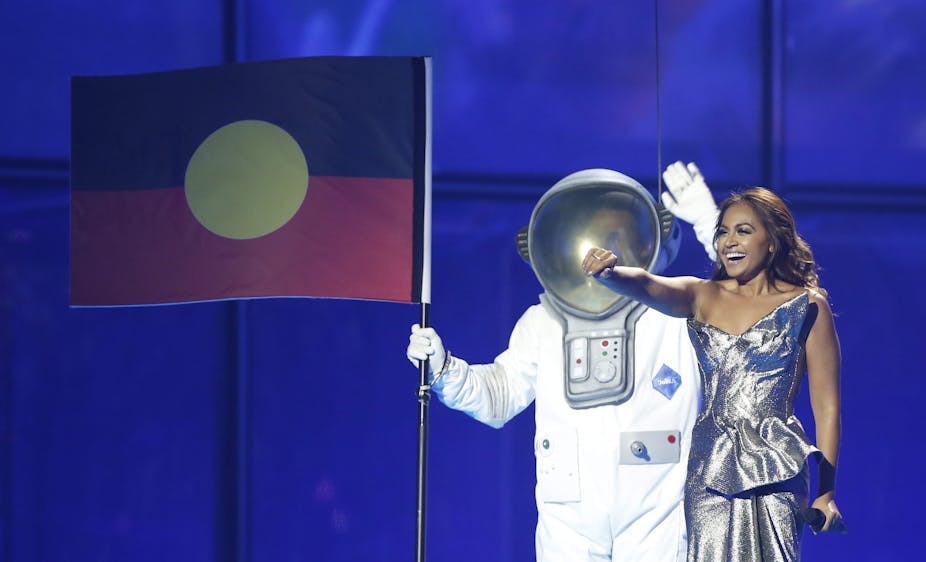Yesterday, it was announced that for the first time, Australia would be given a competitive place in the Eurovision Song Contest. Not only this, but Australians can also vote (and let’s not overlook the financial lure this would have provided the show’s organisers). And what’s more, if we win, it could even become a permanent gig!
Social media revealed immediate excitement at the prospect – but also bewilderment. Why has Australia been invited to compete? Does Australia’s spot at Eurovision mean we have overcome the tyranny of distance? After all those years of being told we were in Asia, does this mean we are now part of Europe?
The confusion is understandable, but it only makes sense if Australia and Europe can be defined in purely geographical terms. This has never really been the case. The limits of what constitutes “Europe” have never been fixed even to this day (ask the Ukrainians). Australia’s own search for its “place in the world” is a recurring theme of public life.
Our inclusion in Eurovision’s unabashed and joyous celebration of musical kitsch can be seen as recognition of our growing national maturity and connectedness. It shows that we are moving away from a sense of being “tucked away” in a remote corner of the globe, and are developing a greater ability to position ourselves in terms of our connectedness to, rather than remoteness from, other parts of the world. For many of us, including the quarter who were born overseas, these connections were not surprising or new.
It also hints at our capacity to shape how the world regards us. Last year’s Song Contest featured a performance by Australian singer Jessica Mauboy, preceded by a segment that included all the clichés that so often represent Australia at international events – not quite kangaroos on bicycles, but koala-headed ladies, AFL players and giant beers.
As cringe-worthy as this may be, for many Europeans, especially east of Berlin, these familiar symbols are the sum total of what’s known about Australia: if you live in Estonia, for example, your main interest in the rest of the world understandably struggles to get beyond Russia.
Mauboy’s performance introduced a dynamic, creative and multicultural version of our country that would be new to many Eurovision viewers, especially when she ended with a proud display of the Indigenous flag, all transmitted via Australia’s under-funded Special Broadcasting Service (SBS), whose own coverage has outgrown its “Sex Between Soccer” tag (but maybe only just).
SBS was established to serve Australia’s multicultural population, and for the past 30 years it has broadcast Eurovision as part of that remit. Its support for Eurovision has been rewarded with our inclusion this year in the contest. This is allowed because SBS (and the ABC) is an Associate Member of the European Broadcasting Union (EBU), a group that includes broadcasters from other countries in our region, such as Japan, Hong Kong and Korea.
Since the collapse of communism, Eurovision has been expanding eastwards. The common cultural form of the pop song (much maligned in communist Europe), in combination with the shorthand indicators of national identity included to show difference, allow for a communicative process to begin that starts with cliché, but can end up somewhere very different, as the success of Austria’s 2014 winner Conchita Wurst showed.

Although many Australians cringed at the “kangaroos and surf lifesavers” imagery that accompanied Mauboy’s 2014 performance, it gave viewers from countries who know nothing else about us an “in” to find out more (and if nothing else, to appreciate a talented Indigenous artist).
The cultural form used – the pop song – is important here as providing a common canvas that can be used to whatever end is required. Popular culture often moves ahead of bureaucracies and diplomacy in opening up new options for cross-cultural exchanges. Popular music in particular as an exemplar of something that moves and mutates, often is the “leading edge” in these sorts of changes.
But Australia’s participation in such regional competitions is by no means settled.
A very different regional competition, the Asian Cup, provided a recent example. On the eve of our win last month, reports emerged that some in the Asian Federation wanted Australia expelled, recalling the rebuffs presented to Paul Keating’s portrayal of Australia as an Asian nation given by Malaysia’s Mahathir Mohamad and Singapore’s Lee Kuan Yew.
A further example of Australia’s changing links to other parts of the world came over the Australia Day knighthood awarded to Prince Philip that almost toppled the Prime Minister. Support for a republic in Australia was predicated on an “if it ain’t broke, don’t fix it” conservatism.
Giving a knighthood to Prince Philip just seemed reactionary. This was not the type of Europe that Australia aspired to any longer, although a guest list featuring Julia Zamiro, Sam Pang, Conchita Wurst and Prince Philip would be a dinner party to conjure with.
Australia’s chances of winning Eurovision and hosting the event in 2016 must be slim, but we can dream. We can also hope that the image of Australia that emerges from it is not exoticised or essentialised, but rather something that speaks to our complex position in the world.

